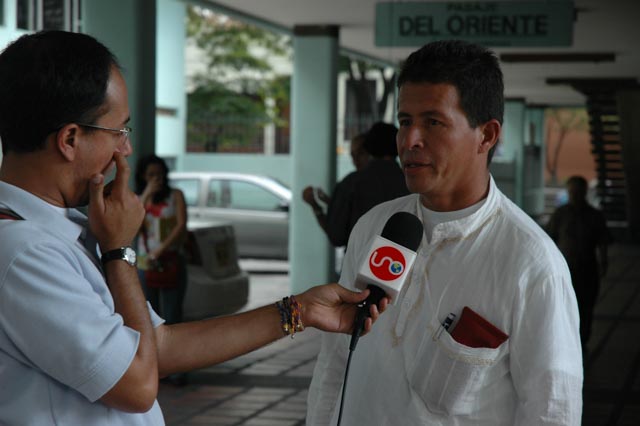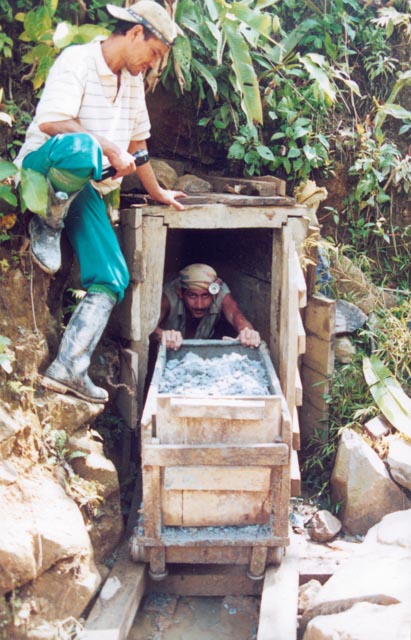Teo Acuña: An Exemplary Struggle
Gearóid Ó Loingsigh
23 February 2022

Teo Acuña being interviewed.
On Tuesday 22nd of February state assassins murdered two leaders, Teo Acuña and Jorge Tafur. I did not know Jorge, but his path was similar to the one taken by Teo, one of struggle and selfless dedication to the cause of the communities of Southern Bolivar and the South of Cesar.
Teo’s persecution is not a recent one, when I met him in 2001, he already had many years behind him persecuted by the state and the multinationals. In the 1990s the multinationals cast their eyes on Southern Bolivar in search of the gold that the small-scale miners and communities exploited. And just as sunset brings the night, the multinationals brought the paramilitaries to the region to facilitate their own entry. They were different times, before the PR crusades, and the foreign governments and NGOs that always try to soften the reality. The paras said “we have come for the gold”, the government of Samper and later on that of Pastrana changed the mining legislation to guarantee that the paramilitaries did not carry out massacres in vain, that the grotesque spectacle of the paramilitaries playing football with the head of the mining leader Juan Camacho was quoted on the stock exchanges of New York, London and Toronto. Teo was in the midst of the resistance to these processes and the massacre of his comrades.
In 1998 he was one of the leaders who organized the Peasant Exodus taking over the city of Barrancabermeja for 103 days and was one of the signatories to the agreement signed with Pastrana. He returned to the territory and lived through and resisted the paramilitary siege and hundreds of murders and the disappearance of his comrade in struggle and fellow signatory of the agreement, Edgar Quiroga. The communities lived through a blockade of food and medicine under the complacent gaze of the local and national authorities. It was very complicated for Teo and other leaders to come in and out of the region. They had to walk long routes, dodging both the paramilitaries and the army, two sides of the one coin. The direct route out of the zone, was the road to death where the paramilitaries and the army waited for him.
So, when I met Teo he had great stamina. He could carry great weight on his hikes through the mountains combined with the speed of a roadrunner. In fact, when he accompanied me when I entered Southern Bolivar to carry out the field work for the book La Estrategia Integral del Paramilitarismo, I realised that many people in the region referred to him as a roadrunner. He did routes in half the time and yet when he walked with others he always went at the same pace as the slowest and he told me laughing about someone who did not wish to show such respect and overtook everyone that he got lost. He showed solidarity even when it came to walking.
After the blockade the multinationals and their mining-energy and agribusiness projects came. Teo fought all these years for the communities to remain in the territory and against the national and foreign interests that aimed to expel them with the support of the state. He took part in the International Tribunal of Opinion: Southern Bolivar Case to take the reports to an international audience. Of course, that Tribunal didn’t happen from one day to the next and Teo for years was one of the organisers of that Tribunal and the Humanitarian Caravan that tried to break the blockade.
Teo never gave up and due to his commitment, he not only had to dodge the bullets but also the prosecutors who tried to imprison him on more than one occasion. They couldn’t kill him then, but not because they didn’t want to, but due to the measures that Teo himself and the communities took. But those measures are, as we know, not a cast iron guarantee and over the years many fell under the bullets of the state and the multinationals. Teo saw how time and again they murdered his comrades in struggle, he was fully aware of the risks he was taking, but he never doubted about continuing on his path.
Ever since the multinationals expressed an interest in the zone the communities have lived under a constant siege, a river of blood and pressure from the state that never gave an inch, no president gave a respite, all of them, Samper, Pastrana, Uribe, Santos and Duque ever gave up on their aims to take over the region and never called off their dogs: the army and the paramilitaries.

A small scale mine in Colombia.
The best tribute we can pay to Teo and also Jorge is victory; the victory of the communities over the multinationals, over the state’s development plans that aim to expel them by hook or by crook, and over the foreign governments that send solidarity greetings to the communities at the same time they send their multinationals, their development consultants and their commercial agreement negotiators who aim to impoverish the country.
The truth will also be another great tribute. We should not accept that in a few years some general goes to the Special Jurisdiction for Peace or some other body to lament the murder of Teo and “confess his mistake”. What happened to Teo and Jorge was no mistake, no slip up. Teo and the other agri-mining comrades in Southern Bolivar were pursued for decades, they were murdered, they were imprisoned. It was not a mistake or a regrettable incident it was long term strategy of the state and the multinationals and they should all pay for it: the functionaries, the presidents of the country, the board of directors of the companies, those who drew up the laws that facilitated this onslaught over this whole period. And the communities’ permanence in the territory is also the victory that Teo deserves.
It was an honour to have known him, to have walked with him and his murder brings me great pain. Colombia has lost a great fighter that they could never break, never beat, so they murdered him. Farewell comrade!